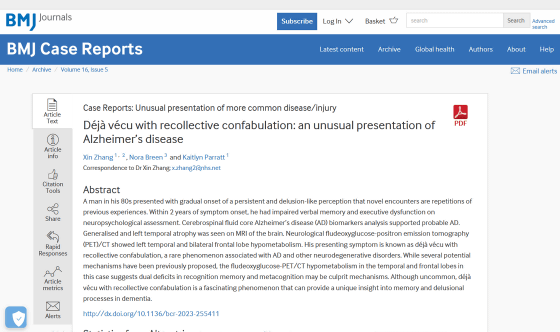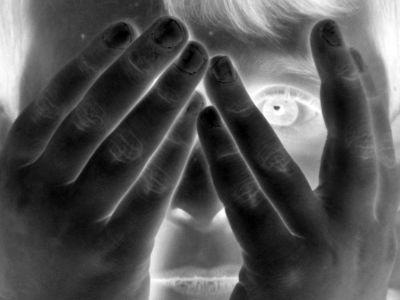Report that the abnormal experience of ``repeating the same event many times'' was actually due to Alzheimer's disease

The feeling of ``repeating the same event over and over again'' is also called
Déjà vécu with recollective confabulation: an unusual presentation of Alzheimer's disease | BMJ Case Reports
http://dx.doi.org/10.1136/bcr-2023-255411

Groundhog Day' syndrome made a man feel like he was reliving the same events | Live Science
https://www.livescience.com/health/alzheimers-dementia/groundhog-day-syndrome-made-a-man-feel-like-he-was-reliving-the-same-events
A man in his 80s in this case report had the feeling that he was witnessing the same scene over and over again. The man complained to the e-book maker that ``the same content appears many times,'' and contacted the technician saying, ``the TV broadcasts the same news many times.''
Speaking of his own experience, the man said, 'Wherever I go, I see the same person standing by the roadside, the same car with the same person behind me...the same person wearing the same clothes, carrying the same bag. I say the same thing and get out of the car... nothing new happens.'

It was a man who reported an abnormal experience as if he had been caught in a repeating loop, but according to the research team, this condition is called 'deja vecu with recollective conabulation (DVRC: dejavecu with collective confusion)', Alzheimer's disease It seems that it may appear as a symptom of neurodegenerative diseases such as disease.
The widely known déjà vu (déjà vu) refers to the feeling of ``I have seen the same scene before'' in front of a scene that I have never seen before. In contrast to déjà vu, which is a temporary sensation, déjà vu is a more persistent sensation, and refers to the feeling that an event that should be new is “an event that has already been experienced many times”.
According to the research team, people with dynamism lack insight into their own condition because of their illness, and develop delusional and erroneous beliefs to justify their abnormal perceptions. About. Although the exact cause of DVRC is unknown, some researchers believe that dysfunction of

A neuropsychological survey of this man revealed problems such as memory loss, impulsive behavior, and cognitive decline, and often confused two separate stories into one story. Brain scans also confirmed abnormally decreased activity in the left temporal and frontal lobes.
Furthermore, examination of
Although the man received immunotherapy, there was no clinical improvement, and tests 4 years after onset reported further deterioration in cognitive abilities. The research team commented, ``The patient's collective confusion symptoms are deep-rooted and serious,'' ``However, the patient continued to live at home and remain independent through self-care.''

Related Posts:
in Science, Posted by log1h_ik







